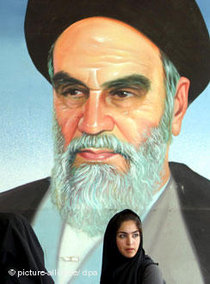A Strategy of Slow Steps


It was a hard blow for the women's rights movement in Iran: last December, the advisory centre run by Iranian Nobel Peace Prize winner Shirin Ebadi was searched by police in Tehran and then shut. Computers and documents were seized.
A party commemorating the 60th anniversary of the UN Declaration of Human Rights was scheduled to be held on the premises of her "Centre for the Defence of Human Rights". The official statement issued by the authorities says that the centre is instigating "propaganda against the system".
Ostensible arguments
But the real reason is different. Ebadi's advisory centre had been passing facts about human rights violations in Iran to the United Nations. This information subsequently appeared in the UN resolution against Iran.
Ebadi is now filing a lawsuit against the forced closure of her office in Tehran. In addition, she has protested against the "violation of rights" in a letter to Chief Justice Ayatollah Mahmud Hashemi Sharudi.
For several years Shirin Ebadi has dedicated her work to fighting for women's rights in her country. For her achievements she became the first Muslim woman to receive the Nobel Peace Prize in 2003. Ebadi used the prize money to found the advisory centre for human rights. Work at the centre includes helping to raise awareness among women.
"Such awareness does not develop overnight," says Ebadi. "It's a long process. Women's voices in Iranian society are heard more today than they were 30 years ago. And now there are many good books and magazines that focus on the situation of women, written out of protest against the inequality of man and woman. These books are now being hotly debated."
Shirin Ebadi strongly believes that the problems faced by women in Iran are rooted first and foremost in the legal system: "We have laws that establish unequal rights between man and woman. For instance, a man can marry several women. He can divorce a wife without her consent. After the divorce the man gets custody of the children, not the woman. These are all legal discriminations."
The "One Million Signature Campaign"
In the summer of 2006 Shirin Ebadi started a campaign for women's rights in Iran with the goal of collecting one million signatures. This is the prerequisite for presenting the Iranian Parliament with a legislative initiative. Since the start of the campaign two years ago, 43 female activists have received summons; 10 of them have been sent to prison.
But the women's rights activists can also point to some successes. One particular legislative proposal caused public outrage in Iran for about a year. The proposed law stipulated that men no longer needed the permission of the first wife to marry a second wife.
After heavy protests, the legislative initiative was finally withdrawn. This was a hard-fought success that shows that the female activists can indeed have some effect against the conservative establishment, declares Iranian lawyer Shirin Ebadi.
The 61-year-old refuses to be intimidated by the current wave of repressive acts. She has already endured and suffered more than this – solitary confinement in the notorious Tehran Evin prison, for example.
Nevertheless, Shirin Ebadi has no plans to leave Iran. She is too aware of her importance for Iranian women and the human rights movement.
Katajun Amirpur
© Deutsche Welle 2009
Katajun Amirpur is an Islam scholar and journalist. She is the author of several books on Iran and Islam.
Translated from the German by Nancy Joyce
Qantara.de
Shirin Ebadi
A Bearer of Hope for Democratic Change
Shirin Ebadi is widely respected as a courageous fighter for the rights of women and political dissidents - such as the Iranian writer Faraj Sarkohi, whom she succeeded in having released after he had spent two years in jail. Here, Sarkohi describes the life and work of his former lawyer, who has just been awarded the Nobel Prize for Peace – a move that sends strong political signals to Iran.
Women in Patriarchal Iran
Between Skepticism, Pragmatism, and Gentle Protest
Although the women's movement in Iran is one of the most progressive and active in the Islamic world, it remains to be seen whether it will truly be able to assert itself in the sclerotic patriarchal system of the Islamic Republic. By Arian Fariborz
Interview with Shirin Ebadi
"Nothing Can Keep Us from Our Work"
The nuclear issue, the president's anti-Israeli tirades — what we have been hearing from Iran recently has been disturbing news. At the same time and almost without provoking attention, the lawyer Shirin Ebadi continues her work in the country. Kathrin Erdmann spoke to her
